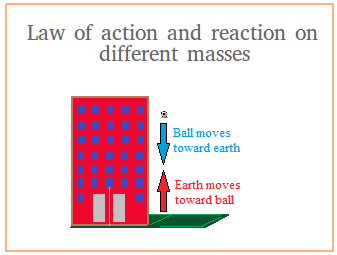Law of action and reaction on different masses
The law of action and reaction on different masses could be illustrated
with the example of a ball dropped from a certain height.
There is an interaction between the ball and the earth.
- The earth pulls down the ball with some force.
- The ball pulls up on the earth with the exact same force.
We could also rephrase by saying the following.
- The ball moves toward the earth.
- The earth moves toward the ball.

However, the distance the earth moves toward the ball is much less and too small to notice.
The reason that the earth moves a tiny distance is because the mass of the earth is very big compared to the mass of the ball.
As a result, the earth's acceleration will be small.
We also need some basic fraction concepts here too to help you understand the concept. Suppose the numerator is the same. What happens when the denominator of a fraction is very big?
The fraction will be very small.
In fact, the bigger the denominator, the smaller the fraction.
Look at the two fractions below. The numerator is the same.
The fraction with a denominator of 9500000 will be much smaller compared to the one with a denominator of 50.
|
8
9500000
|
<
8
50
|
|
8
9500000
|
<
8
50
|
The mass of a soccer ball is about 0.45 kg.
The mass of the earth is about 5.98 × 1024.|
Force
5.98 × 1024
kg
|
is much smaller than
Force
0.45 kg
|
|
Force
5.98 × 1024
kg
|
is much smaller than
Force
0.45 kg
|
Even though the earth's acceleration is negligible, know that it is
there and again it causes the earth to move a tiny bit toward the ball.
Other examples of the law of action and reaction on different masses
a. You hold a rock with a mass of 2 kg. Your friend hold a rock with a mass of 20 kg. both of you throw the rocks until they collide in the air.
They collide with the same force, but the rock with the smaller mass will have a bigger acceleration.
b. You hit a car with a force of 200 N.
The car hits back at you with a force of 200 N. You bounce back with an acceleration that is more than that of the car since you have a smaller mass.
c. A rifle fires a bullet.
The bullet will accelerate forward. The rifle will accelerate backward.
The acceleration of the rifle is less than the bullet since the rifle has a bigger mass.